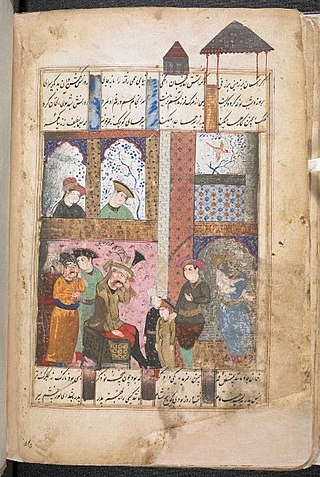
The Undiladze were a Georgian noble family whose members rose in prominence in the service of Safavid Iran and dominated the Shah’s court at a certain period of the late 16th and early 17th centuries.
Rostam Khan or Rostom-Khan Saakadze was a high-ranking Safavid military commander and official of Georgian origin. He held the position of commander-in-chief (sepahsalar) under the Safavid shahs, Abbas I and Safi. In 1643, he was accused of treason and executed under king Abbas II. He features in the contemporary Persian and Georgian chronicles and is also a subject of the 17th-century Persian biography written by a certain Bijan for Rostam Khan's grandson, his namesake and a high-ranking officer in Iran.

Qarachaqay Khan was a military commander in Safavid Iran of Armenian origin. He was known for his great collection of porcelain items and loyal service to Shah Abbas I. Qarachaqay Khan was killed while commanding an expedition against the Georgian rebels.
The Military of Safavid Iran covers the military history of Safavid Iran from 1501 to 1736.
Mirman Mirimanidze, better known as Safiqoli Khan, was a Safavid official and gholam who served during the reigns of Abbas I (1588-1629) and Safi (1629-1642).
Bijan Beg, also known as Bijan Beg Gorji, was a Safavid courtier, official, and royal gholam from the Georgian Saakadze clan. He was one of the most influential and closest servants of king Abbas I in the latter's early reign.
Yusuf Khan was a Safavid gholam and official of Armenian origin who was governor of Astarabad (1604), Shamakhi (1610-?), and Shirvan (1610–1624) during the reign of King Abbas I. Originally a Christian, Yusuf was first employed in the royal mews, and because of his skill in handling and hunting birds and animals, he was soon given the rank of "master of the hunt". Thereafter, he became governor of Shirvan and Shamakhi.

Khosrow Soltan Armani, also known as Khosrow Khan, was a 17th-century Safavid official, military commander, and gholam of Armenian origin. He held numerous posts at various times. First, he served as the prefect of the Bakhtiari tribe for a lengthy period. Then, he served as a steward of the Javanshir tribe in Karabagh. Later, he held the post of "master of the hunt" and was given the governorship of Abhar (Soltaniyeh). Lastly, he also served as the governor (beglarbeg) of Shirvan from 1643 to 1653. During his governorship in Shirvan, Khosrow participated in the successful Safavid offensive during the Russo-Persian War of 1651–1653, which resulted in the Russian fortress on the Iranian side of the Terek River being destroyed and its garrison expelled.
Vakhushti Khan was a Safavid official and royal gholam from the Georgian Orbeliani clan, who served as the governor (hakem) of Shushtar from September 1632 up to his death in 1667 or 1669. His descendants continued to flourish in Shushtar well into Nader Shah's era.
Bijan Beg was a Safavid official and gholam of Georgian origin. He served as a governor (beglarbeg) of Azerbaijan during the reign of king Suleiman I.

Safiqoli Khan was a Safavid official of Georgian origin, who served as the governor (hakem) of Lar in 1629-1630 and in 1632 during the reign of king Safi.
Aslamas Beg, also known as Aslan Khan, was a Safavid official and military commander of Georgian origin. A scion of the Orbeliani family, Aslamas was the second son of Vakhushti Khan, the former governor of Shushtar.
Siyavosh Beg, also known by his nisba of Bāshīāchūghī, was a Safavid military commander, official, and gholam of Georgian origin.

The province of Georgia was a velayat (province) of Safavid Iran located in the area of present-day Georgia. The territory of the province was principally made up of the two subordinate eastern Georgian kingdoms of Kartli and Kakheti and, briefly, parts of the Principality of Samtskhe. The city of Tiflis was its administrative center, the base of Safavid power in the province, and the seat of the rulers of Kartli. It also housed an important Safavid mint.
Gorjasbi Beg, better known as Mansur Khan, was a Safavid military commander, royal gholam, and official from the Georgian Orbeliani clan. He served as the commander of the empire's élite gholam corps (qollar-aghasi) sometime before 1693, and as the governor (beglarbeg) of Qandahar in 1663.
Kaykhosrow Khan was a Safavid military commander and gholam of Georgian descent. He served as the commander of the musketeer corps (tofangchi-aghasi) from 1670 to 1674, during the reign of king Suleiman I.
Aliqoli Khan was a Safavid official, gholam, and high-ranking military commander of Georgian origin, who served during the reign of three consecutive Safavid kings (shahs); Safi, Abbas II and Suleiman I
Rostam Khan was a Safavid military commander, gholam, and official from the Georgian Saakadze family. He served as commander-in-chief, commander of the musketeer corps (tofangchi-aghasi), chancellor/chief justice (divanbegi), and governor (beglarbeg) of the Azerbaijan Province under king (shah) Suleiman I.
The Divan-begi was a high-ranking official in Judicial system of Safavid Iran (1501–1736), who acted as chief justice of Safavid capital and all over the kingdom's courts. It was the Persian form of Turkic Diwan-begi office, also known as the Imperial Chief Justice or Lord High Justice. Divan-begis presided over an appeals court for the kingdom, except for cases involving military officers or religious officials. Divan-begis had deputies to assist them.